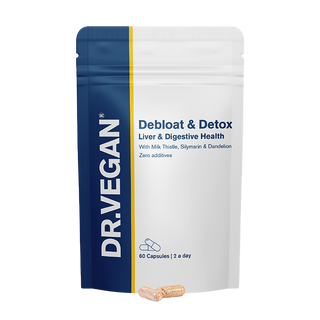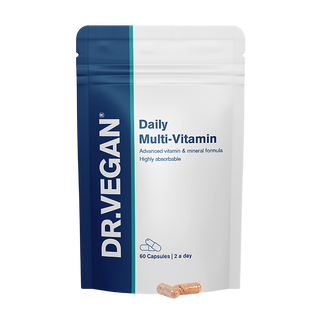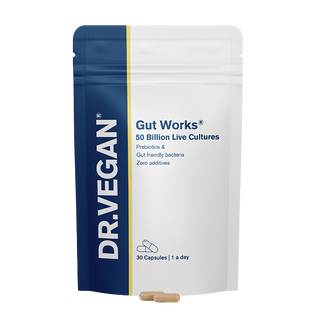10 practical tips to reduce bloating

Bloating is one of the most common gut issues reported. Feeling a little bloated, especially after a large meal, is common and is generally a sign that your gut microbes are well-fed and happy. However bloating can be persistent and cause discomfort, nausea, diarrhoea, affect one's confidence and create other problems. Here are ten practical tips to help 'beat the bloat'!
What causes bloating
Bloating can be a sign of a food allergy or food intolerance, and there are many other reasons you may feel bloated. It's not just down to the foods we eat, but also how we eat. Stress, imbalanced gut bacteria, undigested carbohydrates, and fluctuating hormones, particularly for women around the time your period is due, can increase the likelihood of bloating.
Discover the 7 best foods to help you debloat from our nutritionists or learn more about the 'Surprising reasons you might be bloated'. Bloating can be a symptom of diverticulitis, read about the causes and treatments of diverticulitis.
See what your diet's missing. Create your free Diet Profile.
Tips to beat bloating
1. Smaller, more frequent meals
Too much food at any one time means lots of work for your gut microbes. Instead of having three main meals, split your food intake into four or five smaller meals spread across the day to make things more manageable for your gut microbes.
You might enjoy our article '6 signs of an unhealthy gut'.
2. Take your time
Aim to eat your meals in a relaxed environment, sitting at a table so that you have a good posture for eating and digestion. Digestion starts in your mouth with chewing, which helps physically break food down. The saliva in your mouth has digestive enzymes and helps break down the food further.
Debloat & Detox

Chew your food thoroughly, aiming for around 20 chews per mouthful. Try putting your fork and knife down after each mouthful as this should help give yourself more time to eat.
3. Avoid swallowing air
Try not to talk and eat at the same time and chew your food with your mouth closed to avoid taking in excess air. Limit or cut out fizzy drinks and avoid drinking through a straw so you avoid swallowing excess air.
4. Avoid chewing gum
Chewing gum can cause you to swallow too much air, so avoid gum. Also, most sugar-free chewing gum contains added sweetener such as sorbitol which can cause gut issues like bloating.
Other sweeteners such as mannitol, malitol, sorbitol, xylitol and isomalt which are commonly found in sugar-free products like sweets or drinks can also cause bloating if eaten in excess.
Learn more 'Surprising reasons you might be bloated'.
5. Avoid large fruit smoothies or juices
A 150ml glass of unsweetened fruit juice or smoothie counts as one or your 5-a-day. A fruit juice or smoothie provides a range of beneficial nutrients and plant chemicals (or phytonutrients), but it can be easy to over-consume, especially as they often taste so refreshing!
Daily Multi-Vitamin

Limit yourself to a small glass of fruit juice or smoothie a day, or cut out smoothies and juices completely for a few days to see if that helps reduce bloating. Instead eat whole fruits and have a maximum of one portion (80g of fresh fruit or 30g of dried fruit) of whole fruits per sitting.
6. Go easy on fermented foods
Fermented foods can be really beneficial to include in your diet, in particular for boosting your immunity, but too much of a good thing may not be so good. If you include a lot of fermented foods, such as kefir, kombucha and sauerkraut, try reducing the portions you have for a few weeks to see if it helps reduce bloating. If you currently don’t include many fermented foods, start incorporating them slowly and build up.
You may enjoy our nutritionists' advice on 8 immunity boosting foods.
7. Increase dietary fibre
The recommended average intake of dietary fibre for adults is 30g a day and studies show most adults are only eating an average of about 20g a day (NDNS, 2020).
For most people, including more fibre-rich foods in the diet is associated with a range of benefits for your health. However, eating too much fibre too quickly can lead to bloating as your gut microbes need time to adjust. Learn more in 'What are probiotics'.
If you do increase the amount of fibre in your diet, drink plenty of water. Keeping hydrated will help your digestive system and prevent constipation, which can result in bloating.
Hear from our nutritionists: 5 best carbs for plant-based diets.
8. Be mindful of 'windy' foods
Some foods are more likely than others to cause bloating. Beans, lentils, onions and cruciferous foods such as broccoli, cauliflower, cabbage and Brussels sprouts are known for causing wind and bloating in some people. You don’t need to exclude these foods completely, just reduce the portion size and see if it helps reduce your bloating.
9. Avoid tight clothes
If your clothes are too tight around your waist it can put pressure on your tummy, which makes it harder for food and gas to pass through. Make sure your clothes feel comfortable and not too tight.
10. Try to de-stress
Psychological or social stress can lead to bloating. Stress can slow down digestion, leading to excessive fermentation in the gut and excess gas. Learning how to stay calm and finding a stress-reduction strategy that works for you can help reduce bloating.
For example, listening to a meditation recording, doing some gentle stretches or some yoga may help to relieve stress. A little movement, even a short walk outside, may help reduce stress and can help the digestive process and deflate the bloat. You may enjoy our blog: 6 big signs of stress.
If you enjoyed reading this article, you may also like:
Discover our range of vegan supplements and vegan vitamins.
Want to hear more from us including nutrition tips and recipes? Sign up to our email newsletter for insights and exclusive offers:


















